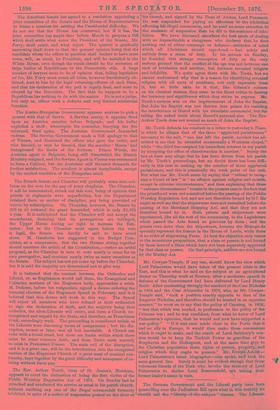Mr. Tooth defends his conduct in a letter to yesterday's
Times, in which he alleges that of the three " aggrieved parishioners" necessary to the suit, " one has left the parish, another has ad- mitted to me that he attended occasionally a Wesley-an chapel," while " the third has resigned his immediate interest in my parish by accepting the office of churchwarden in another." Surely the last at least may allege that he has been driven from his parish by Mr. Tooth's proceedings, but no doubt there has been diffi- culty in this case in making up the number of three aggrieved parishioners, and this is practically the weak point of the suit. But what can Mr. Tooth mean by saying that " refusal to recog- nise a Court of law " is " an offence against religion and morals, except in extreme circumstances," and then explaining that these " extreme circumstances" consist in the present case in the fact that the priesthood were not consulted before the passing of the Public- Worship Regulation Act, and are not therefore bound by 'it ? He might as well say that the shipowners were not consulted before the passing of the Merchant Shipping Act, and that they are not therefore bound by it. Both priests and shipowners were represented, like all the rest of the community, in the Legislature which passed the Acts found so grievous by them ; and the priests even more than the shipowners, because the Bishops do specially represent the former in the House of Lords, while there is no order of shipowning Peers. At best the objection only comes to the monstrous proposition, that a class or person is not bound by those laws of a State which have not been separately approved by that class or person. On that principle, soldiers are not bound by the Mutiny Act.


































 Previous page
Previous page